The Story Behind One Of Mumbai’s Oldest Standing Eatery That Belongs To A Yazidi Family: Yazdani Restaurant & Bakery
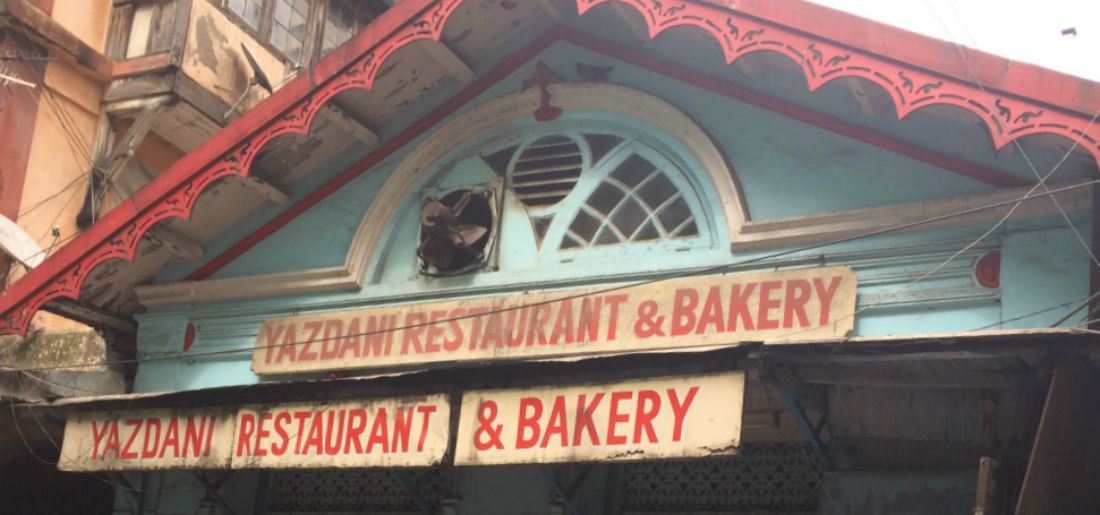
Parvez
Irani could be any old man sitting on the counter of a restaurant
collecting cash. He’s so much trained in his trade that the best of
corporate employees could be put to shame with his no-nonsense demeanour
and a poker face determined to get work done well. He can be quite
intimidating at first, but it’s his eyes that say a different story.
Literally, a different story, because his eyes have a sharp hint of grey
in them, a trait of the Yazidi community from the West Asia.
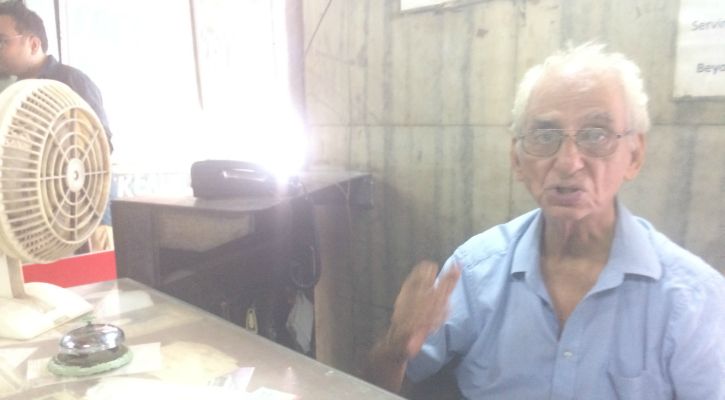
Parvez Irani, the owner of Yazdani Bakery
In another part of the world, Parvez’s community is suffering genocide at the hands of ISIS. None of that seems to remotely affect him, as the now 76-Year-Old Parvez has been born and brought up in Mumbai and calls himself a true patriot (Because he knows the true meaning of the 24 spokes on the Indian flag – he thinks it has not much to do with King Ashoka, but that you’re supposed to do one good deed per hour). He knows more about the Indian flag than anyone of my generation will ever know. He impatiently rings the bell on his counter of the Yazdani Bakery to call on the men who are waiting for the tables of the restaurant and bakery.
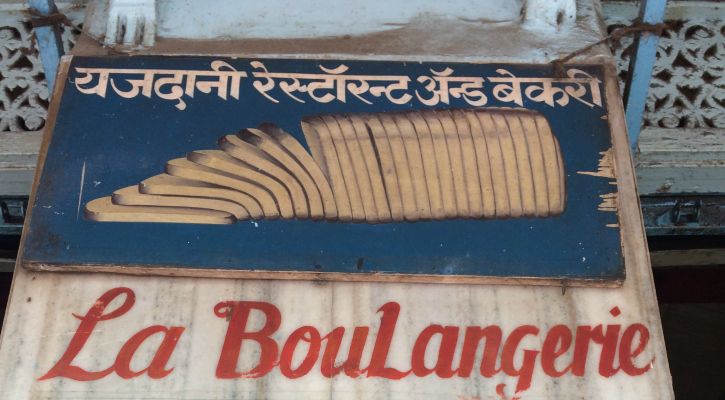
The old style posters still stand at the entrance
Someone once told me that Parsi and Irani bakeries are different, and asked Parvez the same to clear my doubt. Parvez immediately rubbished it and said, “The only difference between us is that the Parsis came 1200 years ago and we came about a hundred. But we’re the same people and every ritual and practice we follow is exactly the same,” he shares with us.
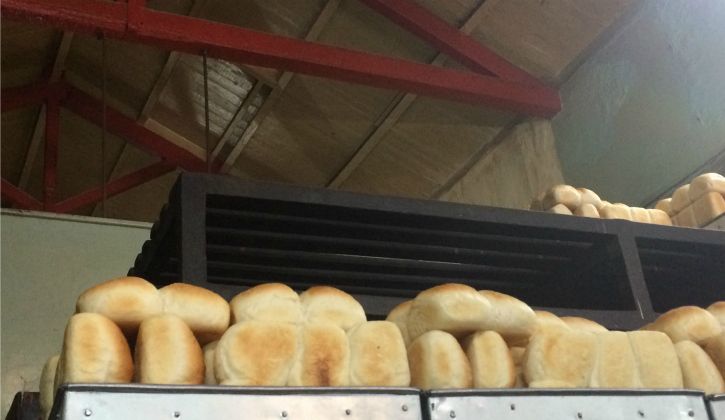
buns are the decor in this old structure
Travelling through the time
Entering
Yazdani bakery is like stepping into a time warp. You’re immediately
transported into what would look like the 1950s, exactly when the bakery
was established. The narrow lane near the Horniman Circle, Fort was
really busy on the Tuesday afternoon we visited.
The
lane itself mirrors the good ol’ Bombay, but swanky Mercs and posh BMWs
passing through the lane are major old-world-charm killers. The bakery,
on the other hand, has a wall full of posters and advertisements from
the yesteryears, with grandfather clocks hung on two walls. Even the
menus displayed outside and inside are written with a chalk on a wooden
blackboard.
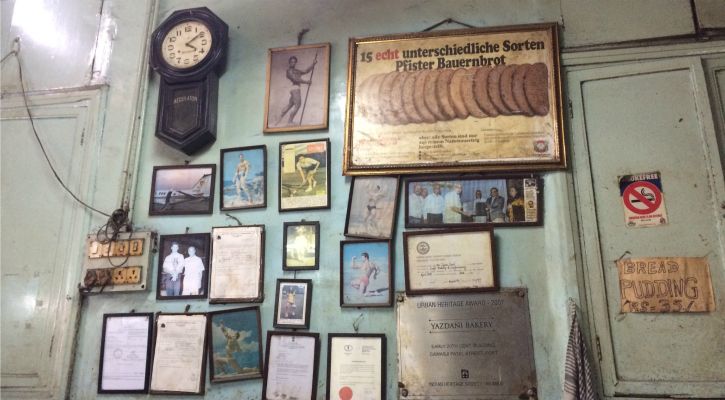
wall with advertisements and posters from the 50s
Parvez tells us that when Babri Masjid was demolished, leading to riots in 1992 in Mumbai, Parvez recalls that Yazdani was the only open bakery in that area, providing food to those stranded and homeless.
“No police or politician made any attempt to come and shut us down. And this support from the people still stands with us,” he tells us proudly.
This is evident when we look around the place that is so sturdy and teeming with regulars and the frequent knells of ‘Bun-Maska-Chai” booming through the room.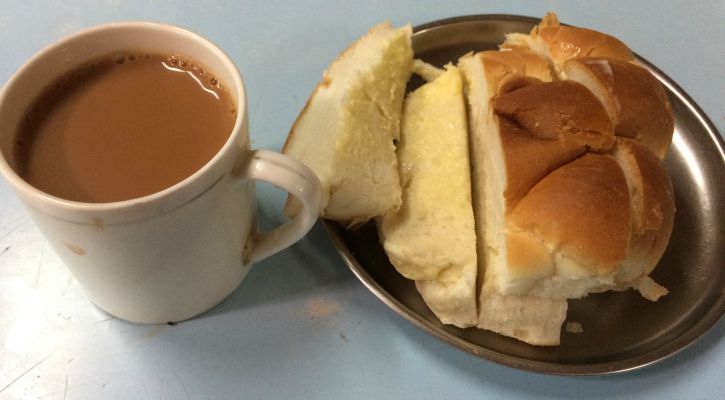
the classic bun maska and tea at Yazdani
The baking style is obviously old – done manually with little to no help of machines. As the bakers stand in the farthermost section of the bakery spraying flour across the gigantic table and kneading kilos of dough with the finesse that would give quite a competition to their French counterparts. And they seem to be in the flow – happy, content, and in almost movements so synchronized they could be called choreographed.
Something old, Something new
The
first Starbucks café in Mumbai had opened in Horniman circle’s fancy
Elphinstone building in 2012, and lives up to the hype of its name – a
comfortable, classy café with a perpetual coffee aroma for the company.
It’s air conditioned, unlike Yazdani bakery which is barely fifty meters
away from the international franchise outlet.
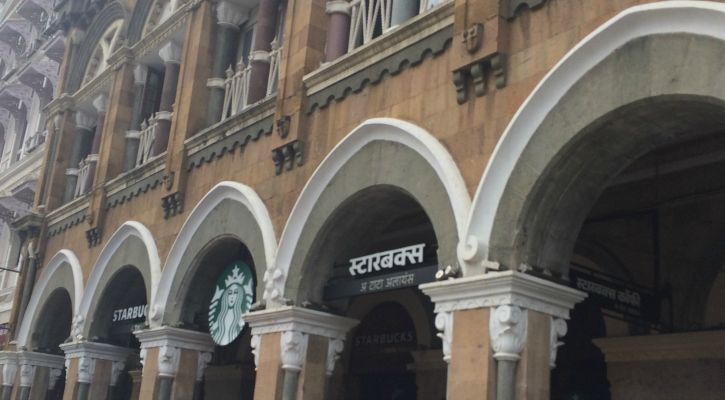
stark contrast between the two cafes near horniman circle
And
yet, Yazdani has a large and loyal fan following. May be it’s the
feeling of having time travelled into a classic Irani restaurant in
Mumbai, or simply the dollops of maska in the bun-maska they offer,
Yazdani is full of character – just like your favourite old book lying
rugged on your shelf.
Parvez’s father had set
up Yazdani Bakery & Restaurant in 1950, which Parvez joined in 1959.
“People used to be so large hearted back then. My father used to give
away food to the poor just like that,” Parvez gestures ‘giving away’
with his skinny, wrinkled hands.
“Sometimes,
people would not have enough money and even then my father would let it
go. The Nehru government had hiked the rates of maida and there was not
much of a scope for profit. But still, my father said that the
difference of one naya paisa should go into the stomach of the
customer and not our pockets. Since then it became a norm to give the
leftovers to the poor. This, was until we could afford a new fridge,”
Parvez laughs and points at one standing at the corner of the
restaurant.
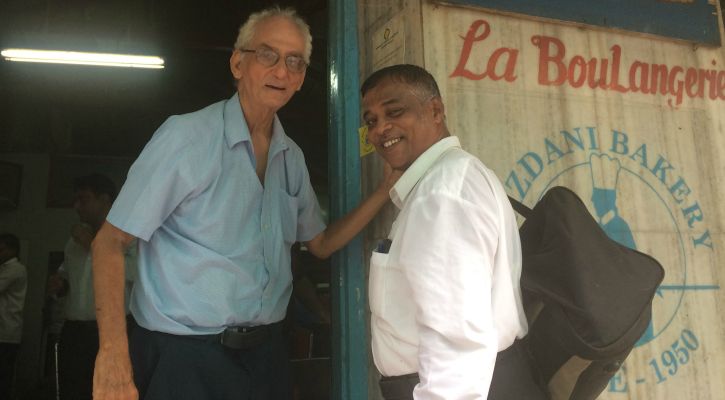
Parvez Irani posing with a friend outside his bakery
Parvez’s family has been into baking for a long time. He tells us that his ancestors were bakers in Iran and were bakers after they came to India. His grandfather had opened a bakery somewhere in Mumbai, where his grandmother used to make bread while his grandfather sold it. Yazdani was later set up in 1950 after his father decided to let go of a partnership business and set up his own.
British architecture under the blue sky
The
structure of this bakery with its sky blue exterior and red painted
roof stands alone among the elegantly carved British architecture on one
side and neat commercial buildings on the other. And it’s surprisingly
bigger on the inside – huge table to knead dough and large ovens to
bake, and still, so much of room left that one could get their dance
rehearsals done while the bread baked in the ovens. Yazdani bakery still
uses an old style bread cutter, which is quite fascinating but
efficient nonetheless. Stacks of hot dog buns are perhaps the only
embellishment in the otherwise faded blue interiors and high vaulted
ceiling above.
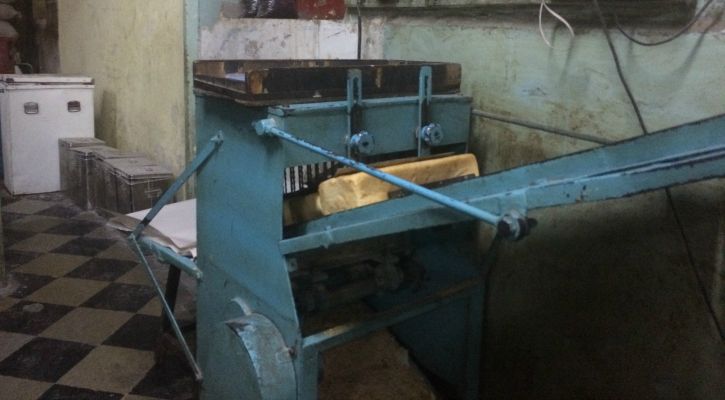
the bread cutter used here is rare and won't be seen elsewhere
It looks like the Irani bakeries of Mumbai are living on borrowed time from three different generations. They serve the same dishes they did back then, and have people loving it, but are slowly being swamped by a different generation who loves polished wooden floors and a crowd that loves imitating an accent.
The speciality of
the bakery – bread pudding usually gets only hours after it is made. So
we sort of made ends meet with an egg puff, bun maska and chai. There’s
a lot more they offer – the apple pie, carrot cake, fiery ginger
biscuits and muffins – all of which almost get over by the end of the
day.
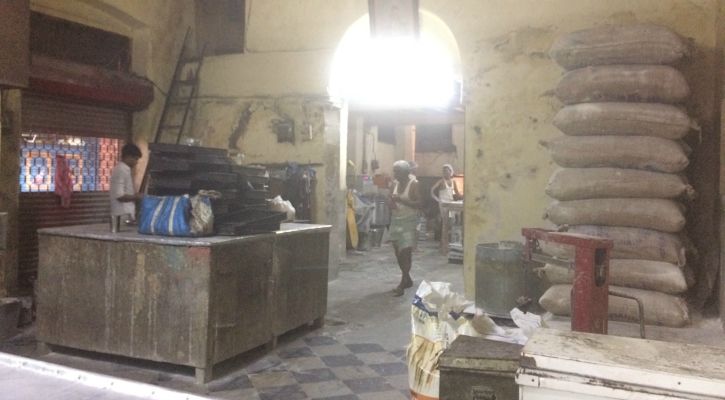
the insides of this bakery are huge and spacious
Parvez’s son Tirandaz may be slightly less perky than his father, but still, has an interesting perspective regarding the death of the Irani café culture in the city. “The new cafés that are taking over the city are very fancy and have more facilities, but I wish that old places like these are retained and managed well. Our coming generations are so much in awe of the westernised world that they will voluntarily not take over the family business or manage the bakery. I would still wish that this bakery went on forever,” he tells us.
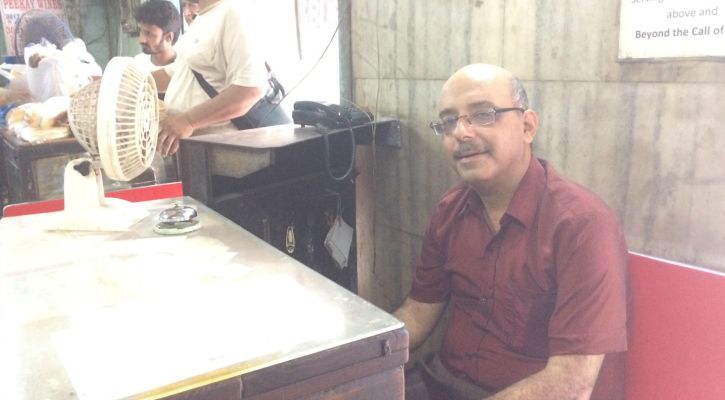
Tirandaz Irani, the next generation who will take the bakery ahead
Is the change good?
Places like the Yazdani bakery are rare. When nobody provided livelihoods to people, the bakeries and restaurants did. Less than a dozen people work in Yazdani, and have been for almost all their lives.Irani bakeries and cafes may look ordinary from the outside and may seem mundane to those who are ignorant to the beauty of the antiquated, but always have something fun to tell. Right from the exteriors to the people who visit it, Yazdani takes you on a trip to a less polished, raw and ragged Mumbai – the one that told tales of its initiation, survival and how it still stands undeterred and moves on but still retains its glamour.

No comments:
Post a Comment